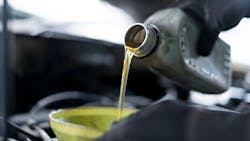Trends in engine oil technology and oil change service continue to evolve. Officials from the American Petroleum Institute (API), Chevron Products Co. and Mobil 1 explain how oil technology is developing — and what tire dealers can do to stay on top of these changes — in this MTD exclusive.
American Petroleum Institute (API): “New engine oils for both diesel and gasoline engines will be here before you know it,” says Jeffrey Harmening, senior product manager at API.
“API is currently working with original equipment vehicle manufacturers to develop the next level of oil performance needed to ensure that the engines under design today will meet the U.S. Environmental Protection Agency ‘s (EPA) tightening emission regulations of tomorrow.”
Harmening says there is a push to protect the “useful life of emissions equipment” for longer periods of time. This is especially evident in the EPA’s final nitrogen oxide control regulations for diesel engines, whose manufacturers must certify diesel engines to a nitrogen oxide idling emission standard of 10g/hour, starting next year.
“Engine oils are trending to even lower viscosity grades and more-improved protection than seen today.”
Harmening says to expect longer oil change interval recommendations from OEMs trends. Tire dealers need to stay current with those, as well as engine oil technology.
“Given the wide array of oil performance and viscosity grade requirements for such a diverse vehicle parc, educating your folks on the latest engine oil performance levels and providing them with the tools to determine which oils to install based on recommendations of the vehicle manufacturer has never been more important.”
The average age of vehicles in operation in the United States has been “climbing for years and sits at an all-time high of 12.5 years,” he also notes.
Harmening says tire dealers should take time to talk with consumers about engine oil technology.
“Let them know what you are putting in their crankcase and be sure to issue a receipt that provides the manufacturer, brand, viscosity grade, performance level and quantity,” he says.
“This level of service will boost their confidence in your business and give them a reason to return to it for their next oil change. Such receipts also comply with state and/or federal laws.”
Chevron: Jim Smiley, product manager at Chevron, says there is a move toward “full synthetics, lower viscosities and lower ash requirements,” driven by OEM requirements.
There also will be growth in hybrid and electric vehicle “penetration” and a “push toward better fuel economy,” driven, in part, by consumers’ personal beliefs.
“Nearly two-in-three consumers are belief-driven, with environmentalism being a key focus,” says Smiley.
He says this is the cause behind the growing demand for sustainable, better-for-the-environment products, which Chevron is aiming to supply with its Havoline PRO-RS oil.
“The Havoline PRO-RS is a renewable, full synthetic motor oil that includes 25% sustainably sourced, plant-based oils. And (it) is better for cars and the environment.
“It’s better for the cars because the passenger car motor oil in our portfolio helps to maintain the oil’s original fuel economy benefits longer than typical full, synthetic motor oils. It’s better for the environment because it delivers lower carbon intensity on a lifecycle basis and is a USDA-certified biobased product.”
“It is important to stay up to date” on oil technology, according to Smiley. This will enable dealers and technicians “to meet customers' needs and carry products that meet OEM requirements — both now and in the future.”
Smiley adds that it’s important for dealers to partner with the best suppliers who will provide education to dealers and technicians; carry top-quality products with brands consumers know and respect; and provide a consultative approach to help find the best solutions that will help meet the customer's needs.
The best way for tire dealers to convey this information is through website content, technician training, consumer videos that stream in waiting rooms and in-store posters, he believes.
Mobil 1: Benjamin Eirich, technical program manager for passenger vehicle lubricants at Mobil 1, acknowledges the major trend to synthetic motor oils and that technology advancement is still progressing towards “higher-quality, lower-viscosity base stocks.
“Additionally, additive technology has advanced to lower levels of sulfated ash for protection of emission aftertreatment devices. And new detergents have been developed to protect against higher boost pressures and compression rations.”
Eirich says Mobil 1 has followed these trends by developing oils that can extend drain intervals and protect engines longer between oil changes.
This helps with the overall maintenance and cost of vehicle ownership.
Eirich believes it’s important for tire dealers to know the latest industry and OEM specifications when selecting the right motor oil for consumers’ vehicles.
“Using a tool like the Mobil Oil selector on Mobil 1’s website ensures you select the right motor oil.”
It also is important for consumers to be knowledgeable, so they know they are purchasing the correct product for their vehicle.
“Vehicle owners should educate themselves on motor oil technology, viscosity grades and specifications. Having a good understanding of these differences could help them choose different viscosity grades for different purposes, or upgrade for a higher performance.”
About the Author
Madison Hartline
Associate Editor
Madison Hartline (Gehring) is the associate editor for Modern Tire Dealer and Motor Age. Since joining MTD after graduating from The Ohio State University in 2022, she has taken on the role of managing the brand’s social media strategy, producing podcast episodes and overseeing eNewsletter content.
Don't miss Hartline's next article. Sign up for MTD's newsletter.

